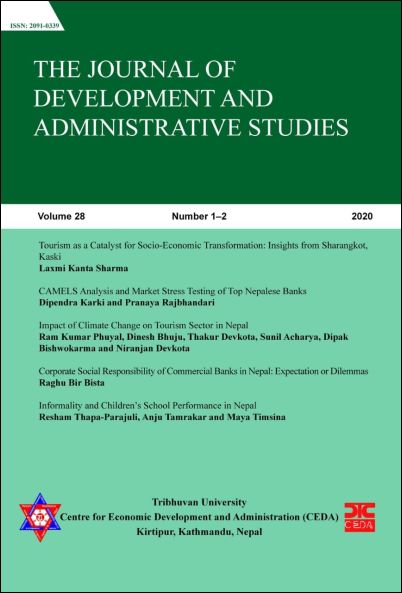CAMELS Analysis and Market Stress Testing of Top Nepalese Banks
DOI:
https://doi.org/10.3126/jodas.v28i1-2.64377Keywords:
Financial stability, CAMELS, Stress test, Capital adequacy, Earnings, LiquidityAbstract
This study presents a comprehensive study of the financial stability and resilience of commercial banks in Nepal using the CAMELS approach and market stress testing. The study analyzes the performance of sample banks and examines the relationship between CAMELS variables and bank performance. The results highlight five key factors influencing bank performance in Nepal: capital adequacy (CA), asset quality (AQ), management quality (MQ), liquidity (LQ), and sensitivity to market risks (SQ). These factors have a direct influence on performance i.e. earnings per share (EPS) of the banks. Multiple regression analysis confirms significant relationships between EPS and CA, AQ, MQ, LQ, and SQ, with no significant relationship with earnings quality (return of assets; ROA). Variance inflation factor analysis confirms no multicollinearity among the variables. The study conducts stress tests on market risks such as interest rate changes, exchange rate shocks, and equity shocks to assess and measure the risks associated with market uncertainties. The findings demonstrate that top-performing banks can maintain their Capital Adequacy Ratio (CAR) above 11% under different base rate changes, showcasing their ability to maintain the required level of soundness for operations. Considering all aspects of the CAMELS analysis and market stress testing, NABIL Bank emerges as the top-performing bank, followed by Nepal Investment Bank. This research holds significant importance in assessing the financial stability and resilience of commercial banks in Nepal. The findings provide valuable insights for decision-makers in the banking sector to identify areas for improvement, contributing to a robust financial system. It also contributes to financial performance evaluation literature for researchers, policymakers, and banking industry stakeholders.
Downloads
Downloads
Published
How to Cite
Issue
Section
License
The copyright of the accepted articles is reserved by the Centre for Economic Development and Administration (CEDA), Tribhuvan University (TU). No part of the article published in this journal should be reproduced except provided by the law currently in force without the written consent of the centre.




